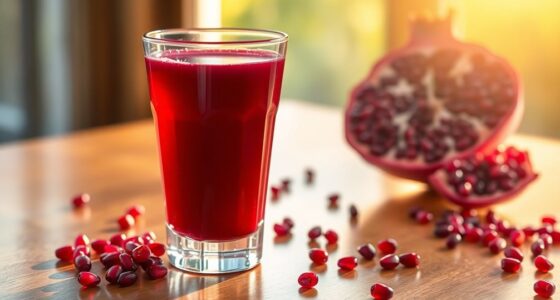Orange juice is mildly acidic, with a pH ranging from 3.3 to 4.2. This acidity comes mainly from its high citric acid content, which gives it a distinct sour flavor. While it's less acidic than many soft drinks, frequent consumption can pose risks to dental health and might trigger digestive discomfort for some. Practicing moderation and other tips can help mitigate these effects. Curious about how to enjoy orange juice safely and healthily? There's more to explore!
Key Takeaways
- Orange juice has a pH range of 3.3 to 4.2, indicating it is slightly acidic.
- The acidity is primarily due to high levels of citric acid, giving it a sour taste.
- Compared to many soft drinks, orange juice is less acidic, as they can have pH as low as 2.5.
- While nutritious and packed with vitamin C, the acidity can cause dental erosion if consumed excessively.
- Individuals prone to digestive issues may experience discomfort due to the high acidity of orange juice.

Have you ever wondered just how acidic orange juice really is? You might be surprised to learn that the pH of orange juice typically ranges from 3.3 to 4.2, which indicates that it's slightly acidic. This acidity is primarily due to its high levels of citric acid, the compound responsible for that refreshing sour taste you love.
While orange juice may seem tart, when you stack it up against other beverages, it's actually less acidic than many soft drinks. For instance, some sodas can have a pH as low as 2.5, making them much more acidic than your morning glass of OJ.
Despite its acidity, orange juice is often regarded as a healthy drink. It's packed with vitamin C, a powerful antioxidant that can boost your immune system and provide numerous health benefits. When you sip on this delicious beverage, you're not just quenching your thirst; you're also giving your body a dose of essential nutrients.
However, it's important to remember that moderation is key. While enjoying orange juice can be beneficial, consuming it in excess may lead to some unwanted side effects.
One of the concerns related to the acidity of orange juice is dental erosion. The high levels of citric acid can wear down tooth enamel over time, especially if you drink it frequently or sip on it throughout the day. If you're a fan of orange juice, it's wise to be mindful of your dental health.
You might consider drinking it through a straw, which can help minimize contact with your teeth. Additionally, rinsing your mouth with water after drinking orange juice can help neutralize the acidity and protect your enamel.
Another issue that can arise from consuming too much acidic juice is digestive discomfort. For some people, high acidity can lead to heartburn or upset stomach. If you've ever felt a burning sensation after downing a glass of orange juice, you know what I mean.
If you're prone to digestive issues, it may be best to limit your intake or choose a less acidic alternative. Alternatively, you could dilute your orange juice with water to make it milder on your stomach while still enjoying its refreshing taste and health benefits.
Frequently Asked Questions
Is Orange Juice Highly Acidic?
You might wonder if orange juice is highly acidic. While it’s classified as moderately acidic, with a pH range of about 3. 3 to 4. 2, it’s not as harsh as some soft drinks. Moreover, the acidity of orange juice can be mitigated when consumed with food, making it less likely to cause discomfort for those with sensitive stomachs. If you’re curious about the yield of this refreshing beverage, you might be wondering how much juice in one orange can actually be extracted. Typically, one medium-sized orange produces about 1/4 to 1/3 cup of juice, providing a delightful boost of vitamin C along with its tangy flavor.
The citric acid gives it that sour punch.
Just remember, even though it's packed with vitamin C and other nutrients, drinking too much can lead to dental erosion.
Enjoy it in moderation to reap the benefits without the drawbacks!
What Is the Most Acidic Fruit Juice?
You might think that the most acidic fruit juice is something sweet and delightful, but surprise!
It's actually lemon juice, with a pH of around 2.0 to 3.0. That's right; this tart liquid is more acidic than any of its fruity competitors.
Lime juice is a close second, while cranberry juice and grapefruit juice follow, but none can compete with the zesty lemon.
What Is the Least Acidic Fruit Juice?
When you're looking for the least acidic fruit juice, pear juice often tops the list, with a pH level between 3.5 and 4.6.
You might also consider tomato juice, which, despite being a vegetable juice, has a similar pH range.
Watermelon juice and coconut water are even milder, with pH levels around 5.2 to 5.6 and 5.0 to 5.4, respectively.
These options are great if you want something gentle on your stomach!
Is OJ More Acidic Than Coffee?
Imagine sipping a glass of orange juice, feeling that sharp tang dance on your tongue.
Now think about your morning coffee, smooth and almost comforting.
You might be surprised to learn that orange juice is indeed more acidic than coffee.
With a pH range of 3.3 to 4.2, it packs a punch compared to coffee's milder 4.5 to 6.
Conclusion
So, the next time you sip that refreshing glass of orange juice, remember its acidic punch. It's not just a tasty treat; it can also sneak up on your teeth and stomach if you're not careful. But what if too much acidity could lead to a surprising twist in your health? You might want to rethink that second serving. After all, the zest of orange juice might come with a hidden cost that's worth considering.
Cindy thoroughly researches juicing trends, techniques, and recipes to provide readers with practical advice and inspiration. Her writing style is accessible, engaging, and designed to make complex concepts easy to understand. Cindy’s dedication to promoting the advantages of juicing shines through her work, empowering readers to make positive changes in their lives through the simple act of juicing.











